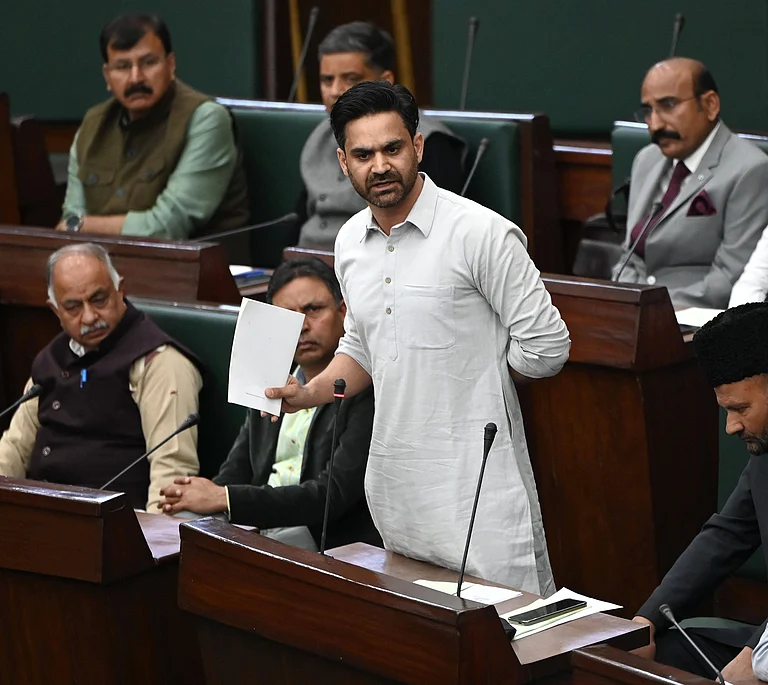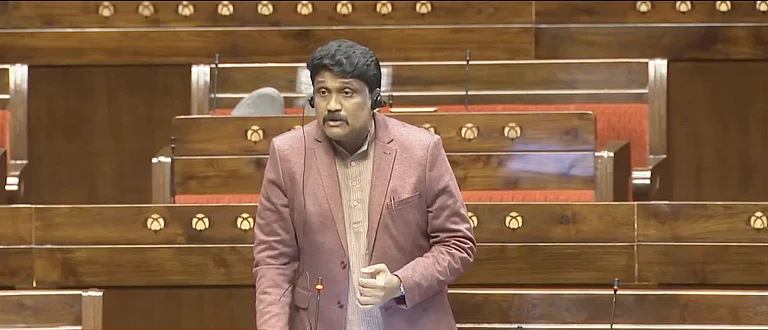THE moment the news came out that P. Chidambaram was the new finance minister,there was a loud whoosh of relief from Indian industry, which had been holding itscollective breath as the Deve Gowda Cabinet wrangled for several hours over portfolioallotment on the evening of June 1. For Indian business had been rooting as much as,reportedly, Chidambaram himself that he gets the nations top economic job."Everyone in industry is happy," bubbled industrialist Arun Bharat Ram.
"In fact, we have cause for a double celebration. Since he has also been givencharge of Law, Justice and Company Affairs, Chidambaram can now push ahead themuch-needed modifications to the Companies Act. All administrative problems emanate fromsome lacunae in this Act," Ram added. Eicher group CEO Subodh Bhargava chimed in:"If any doubts about liberalisation lingered, they have been dispelled withChidambarams selection." Others felt that Chidambaram, who had possiblycontributed as much to economic reforms as Manmohan Singh but had never got his fair shareof credit, was at last getting his rightful place in the sun.
But even as businessmen both Indian and foreign were looking at the formercommerce minister as a progressive economic thinker firmly committed to unshackle businessenergy, there were dissenting voices. Chidambaram is an elitist snob, they carped, anideologically barren turn coat obsessed with his own career goals, the ultimatesurvivor. "Chidambaram is a most unreliable and amoral person," fumed formerCongress MP Mani Shankar Aiyer.
There is little chance that the man himself will ever shed any light on the realChidambaram. On that evening, as the crowd of journalists waiting outside the PrimeMinisters South Block office rushed towards the departing Chidambaram to get aninkling of whether he had got the finance portfolio, one of them, trying to catch him off- guard, asked when he was going to present his budget. Chidambaram stopped momentarilybefore getting into his car, smiled, and said: "You cant trick me, Im alawyer. "
The Elitist Snob: That clipped BBC accent, that cold to-the-point conversationstyle, that Harvard Law School education, that inherited wealth. Chidambaram comes fromthe rich trading community of Chettiars, and moneylending is the traditional profession ofthe Nagarathars, his clan. His immediate family has interests in textiles; A.C. Muthiah ofthe SPIC group is his cousin. "He has no mass base," sneer his detractors."He is far more comfortable in suits than in that shirt and veshti hesports." And even in that spotless white Tamil attire, hostile observers see acertain aloof hauteur.
Yet, this is the man who defied family tradition as a young man in two crucialways he shunned the family business to become a lawyer, and he married outside hiscaste. For these twin crimes, he went unforgiven by the Chettiars of Nattukotai for years.He joined the Congress after it lost power in Tamil Nadu in 1967. When the partysplit in 1969, he, along with his political mentor C. Subramaniam, chose to remain loyalto Indira Gandhi. In addition to taking charge of the party organ Swadeshamitran,the 25-year-old would accompany Indira on her tours of the state and translate herspeeches. Chidambarams anglicised image hides the fact that in the last 25 years, healone has been able to match DMK politicos in rousing Tamil oratory. "He was, and is,one of the few Congressmen who can speak Tamil with a certain flourish andelegance," says Valampuri John, a former MP. In fact, his love for Tamil literatureis deep. Along with his brothers Laksmanan and Bharathi he establishedIllakiya Chintanai (Literary Thought), a movement that has been credited with identifyinga host of original writers in the language.
The No-Ideology Turncoat : "As the minister in charge of theinvestigation into Rajiv Gandhis assassination, he knows better than anyoneelse that there were direct links between the D M K and the assas-sination. It was forthis very reason that the Congress ruled out any alliance with the D M K. But he betrayedthe party and joined forces with them," rages Aiyer. Unadulterated jealousy? Butthere have been enough charges against the new finance minister that he can changeideologies with the felicity of Clark Kent in a phone booth.
After all, didnt he come back from the US in the late 60s as a socialistand a strong believer in the command economy? In those heady post-Congress-split days,didnt he, in speech after vitriolic speech, lambast leaders like Kamaraj as "renegade right-wingers", and explain at length to the populace how banknationalisation would usher in an unmatched era of rural prosperity? And some of thosearticles of his in Swadeshamitran dont they sound rather like what C PI(M) ideologue Prakash Karat says today? And notice, too, that while he emerged asthe principal young votary of state control, as a lawyer, his clients were the very bluechip corporations that supposedly stood against all his socialistic beliefs.
So when liberalisation became the buzzword, Chidambaram dug a deep hole andburied his past there and emerged overnight as the commerce minister who would tear downevery trade barrier to take India into a globalised future, say his detractors. "Ihope the countrys economic fate will be safe in the hands of a man who hasdemonstrated a notorious capacity for shifting loyalties. Chidambaram, who is onlyinterested in his own ends, has so far changed parties four times," says Aiyer.
The fourfold shift is a huge exaggeration. For, Chidambaram has always been with theCongress starting off with the C. Subramaniam faction, and now with the G.K.Moopanar break-away group. And about the lawyer called Chidambaram, he has never made asecret of the fact that he has not allowed his political career affect his legal one, andis genuinely proud of his ability to make a good living independent of his politics.
"He started changing his beliefs gradually over time, and became a strong votaryof liberalisation in the mid-80s when Rajiv Gandhi was prime minister. But there isnothing wrong in changing your beliefs with the times," says former Cabinet colleagueand Congress(T) leader Rangarajan Kumaramangalam. "Its unfair to rake up hispast as most of us were enamoured of Fabian socialism in the 1970s," says V.Raghuraman, secretary - general , ASSOCHAM. "Even Dr Manmohan Singh was a confirmedsocialist. The face of all Communist countries is changing, with privatisation recognisedas the right path. So what is the shame in Singh or Chidambaram changing tack?"
The Ultimate Survivor: When Chidambaram joined the team led by the late MohanKumaramangalam to break the DMK in 1972, he could hardly have imagined that 24 yearslater, he would be contesting elections with the support of M. Karunanidhi. In fact, inthe formative years of MGRs party ADMK (as it was then known), he was one of theliaison men between MGR and Indira Gandhi. Proximity to MGR fetched him a parliamentarytickethe won the seat in 1977. But in the 1980 elections, Mrs Gandhi dumpedMGR and chose Karunanidhi as her Tamil Nadu partner. Chidambaram was denied a ticket. Hewaited out the early 80s calmly, without getting into the internecine crossfirebetween then AICC general secretary G.K. Moopanar and then Union finance minister R.Venkataraman.
Chidambarams Harvard background and urban polish, however, fitted RajivGandhis dream of a youthful Congress to a T. And with his refusal of the firstministerial post offered to him Chidambaram pointed out that since his family was inthe textile business, there would be a conflict of interest if he became minister of statefor textiles endeared him to the prime minister. He was accommodated in the homeministry. As the Indo-Sri Lanka crisis escalated, he became Rajivs key emissary toMGR. But when Jayalalitha came to power, in 1992, he became the first Central minister tobe attacked by AIADMK goons. He escaped narrowly, the window-panes of his cars smashed,but kept his cool and did not go against the party high commands directives. Morerecently, it had become starkly obvious to everyone except P.V. Narasimha Rao that analignment with Jayalalithas AIADMK would be political suicide for any TamilCongressman. Only then did the man who had drafted the official Congress manifestoreluctantly decide that he had to fight the Congress candidate at Sivaganga. "Peoplemay call him a snob, but he is intelligent enough to gauge the currents. He is pragmaticenough and not one to get caught in delusions with value systems that are not relevant tothe times," says Kumaramangalam.
The Economic Thinker: What Chidambarams detractors dont like isthat, as the votary of bank nationalisation and abolition of the privy purses in theearly 70s, and while justifying the Emergency in the mid-70s, defending theDefamation Bill in the late 80s, discovering the virtues of market forces in theearly 90s, and finally articulating the need for a federal polity, he has alwaysseemed to be on the winning side. But then you could also call him simply a loyalCongressman, except in the last few months.
As he moves into the office he has coveted and Indian business has hoped he wouldget the new finance minister would surely know that he has to do a tightrope walktougher than anything Manmohan Singh had to undertake. And with the economy teetering on acritical midcliff ledge, his task would perhaps be far more complex too. As commerceminister, the world got the feeling that this man instinctively believed inwhatever the reforms stood for. And he enjoyed his work. Hence all those hopes. Canhe deliver?
"Despite the different pulls and pressures from the various constituents of theUnited Front, we believe that the finance minister will not let economic reforms goastray," says Arun Bharat Ram. "Though, because of the internal contradictionsof the United Front, he may not be able to push the reforms as much as he would want to,and may have to concede some things." Says industrialist K.K. Modi: "Bydefinition, I think his job will be very difficult since he has to find a common pathbetween different ideologies. He is handling a very important ministry which has acascading effect on the economy, so he must be careful and be able to carry themalong." But the bottomline, businessmen believe, is firmly positive. "Of course,he will have to go by consensus and collective decisions of the Cabinet and find a way outof the opposition he may encounter on certain issues like PSU divestment andrestructuring. But the scenario is now definitely more positive than when there was firsttalk of the United Front forming the government," says Bhargava.
While other politicians have nurtured mass bases founded on demographics, Chidambaramhas been assiduously carving out his own constituency in Indian polity management ofthe nations economy. The newcomer in North Block would surely know that never has anIndian finance minister come into his job with the hopes and best wishes of so many ridingwith him; Manmohan Singh, after all, was an unknown quantity when he took over.Ideologically barren, turncoat survivor, elitist snob, for the sake of the Indian economy,P. Chidambaram must refute these allegations with his actions. That is the mandate thenation has given him.























